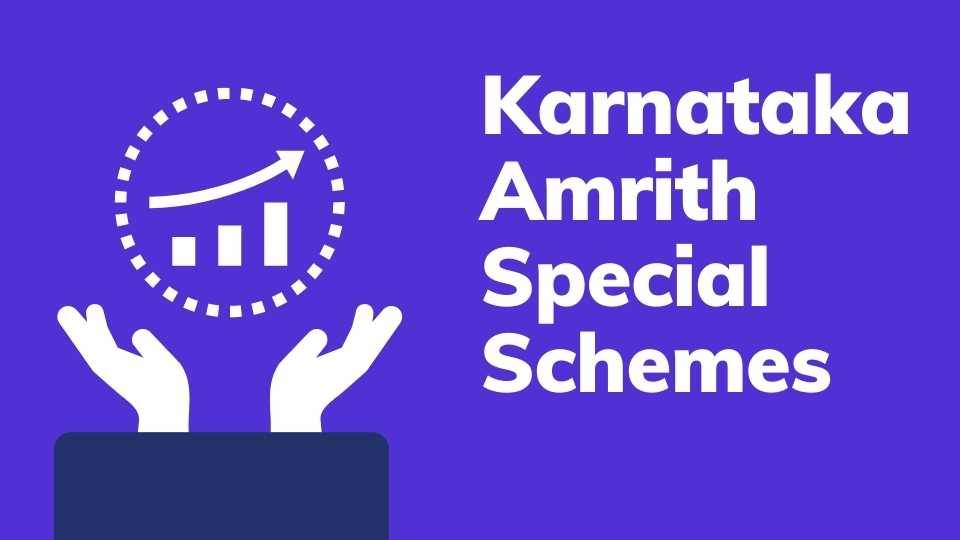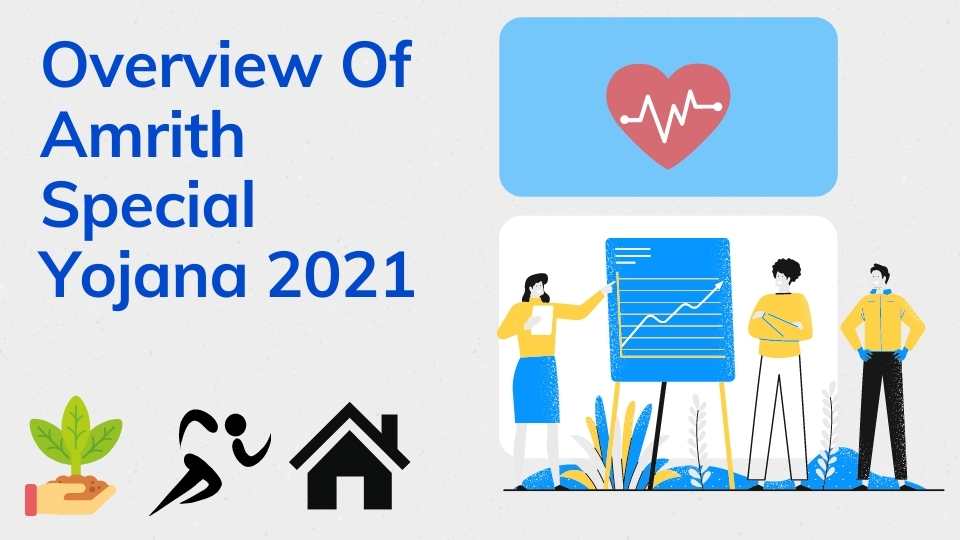On the 75th Independence Day, Karnataka CM Basavaraj Bommai launched 11 new ‘Amrith Special Schemes’ for the state. Here’s an overview of the schemes.
This year on the occasion of the 75th Independence day of India, the Karnataka state government had come up with 11 new schemes for the overall development of the state of Karnataka. The Chief Minister, Basavaraj Bommai launched these schemes as ‘Amrith Special Scheme’. It was said that these schemes will focus on the holistic development of the state of Karnataka.
The new schemes were introduced for speeding up development in areas like the infrastructure sector,sports, agriculture,the social sector, the housing sector, the health infrastructure, micro enterprises etc.
A total budget of Rs.1000 crore was set aside for the implementation of Amrith Special Schemes, and the government planned to focus on mega as well as mini development projects through these schemes.
Table of Contents
What Are The Names Of The Amrith Special Schemes In Karnataka?
The 11 new schemes as announced by the Karnataka government are namely the Amrit Gram Panchayat Scheme, Armith Farmer Producer Organisations scheme, Amrith Rural Housing Scheme, Amrith Anganwadi Centres scheme, Amrith Nirmala Nagara scheme, Amrith Self Help Micro Enterprises scheme, Amrith Health Infrastructure Upgradation programme, Amrith Community Development project, Amrith Skill Training scheme and finally, the Amrith sports adoption programme.
In this article, we will go over the features of each of these schemes launched by the Karnataka government. .

Amrith Gram Panchayat Scheme:
This scheme out of the bunch of Amrith Special Schemes aims at overall development of selected 750 gram panchayats. This will include installation of street lights, availability of drinking water, proper segregation of solid waste etc.
The government has laid down basic guidelines that are to be strictly followed while implementing the scheme. In each phase of the scheme, several villages will be chosen for the scheme and the execution of the project will be time-bound.
The Chief Minister stated that under this scheme, community halls will be constructed across villages. If it’s viable, some portions of these community halls should be used as public libraries. Moreover, overhead water tanks should strictly not be constructed on school premises or near areas having high population density.
Amrith Rural Housing Scheme:
Karnataka has a large number of homeless people. As per a survey conducted in the year 2019, there are currently around 4,200 homeless people in the city of Bangalore alone. Moreover, this number was not precise as it was based on an informal head count done in major public areas. It was said that if a thorough survey would be conducted, the actual number of homeless people could be more than 10,000.
Under Amrith Special Schemes with Amrith Rural Housing Scheme, the government will identify all homeless people in the selected 750 gram panchayats and provide them with a proper housing facility.
Amrith School Infrastructure Project:
This scheme is dedicated for improving the schools in the rural areas of Karnataka. The state will spend on renovating the school buildings, science labs, building libraries and maintaining toilets. Budget wise, Rs. 75 crore will be spent on a total of 750 schools and each school will receive Rs. 10 lakh each for infrastructure upgradation under Amrith School Infrastructure Project.
Amrith Farmer Producer Organizations Scheme:
What is a Farmer Producer Organization?
A Farmer Producer Organization (FPO) is an organization whose major operations are the supply of seed, machinery for agriculture, market linkages, fertilizers and pesticides, farming training, technical and financial advice to the small farmers of an area.
The intervention of a Farmer Producer Organization ensures a better income for the farmers through an organization of their own.
Also Read:
Small farmers individually don’t have the volume of produce for getting the benefit of economies of scale. In the agricultural marketing industry, there are chains of intermediaries due to which the initial producer receives only a small portion of the value which the ultimate consumers pay. Via an FPO, this is eliminated.
To ensure that the local farmers of the state get the desired profit by selling their crops and don’t fall into a debt cycle, the government, under this scheme is planning on spending Rs. 225 crore on the setting up of around 750 farmer producer organizations in order to promote ample production and profitable marketing of agriculture products. Along with agriculture products, marketing of fisher and weaver products will also be ensured. Each producer organization that is set up will receive Rs. 30 lakh for three years under the scheme.
You May Also Like:
Amrith Nirmal Nagara Yojana:
The Amrith Nirmal Yojana aimed at maintaining the cleanliness and beautifying the areas that came under the selected 75 urban local bodies. For this purpose, Rs. 75 crore will be spared from which each urban local body will receive Rs. 1 crore.
Amrith Anganwadi Centres project
What Is An Anganwadi Centre?
The Anganwadi Centres(AWCs) are part of the Integrated Child Development Services (ICDS) yojana initiated by the central government. These centres provide basic healthcare facilities like nutrition, education and counselling to pre-school children in rural areas.
There are about 66,361 anganwadi centres in the state of Karnataka. Under the Amrith Anganwadi Centres project, the government had planned on spending Rs. 7.5 crore in order to upgrade selected 750 anganwadi centres in the state to ensure proper nurturing of the backward pre-school children in Karnataka.
Amrith Self Help Micro Enterprises
What is a Self Help Micro Enterprise?
A micro enterprise or a Self Help Group (SHG) is basically a group of 10 people or less which sells goods and services to a local market. It is usually geographically restricted. A micro enterprise starts with funding known as micro finance or micro credit.
Micro enterprises are a part of the economic scenario of a developing country such as India. These enterprises help in filling the gap between the shortage of jobs in the formal sector and the skilled rural people. By creating new jobs, they help in boosting the economy. They also help in lowering production costs and hence increasing the purchasing power of the people.
Governments encourage these micro enterprises or Self-Help Groups, especially in the low-income rural areas. Such enterprises also promise sustainable development.
The Self Help Group approach also empowers the weaker or more vulnerable sections of the society such people with physical disabilities, marginalized communities and women.
Under the Self Help Micro Enterprises scheme, the government will spend Rs. 75 crore in order to provide the seed money to selected 7,500 self help groups. Likewise, each Self Help Group will get Rs. 1 lakh.
Amrith Community Development Programme:
The term ‘community development’ essentially means the overall development of the people belonging to a particular community.
Under Community Development projects, the problems and needs of the people of a community are identified and the community then tries to solve them by putting the best of their efforts. This witnesses an active participation of all the people of the community.
Members of a community have a sense of belonging together and a feeling of common membership. This feeling is known as ‘community sentiment’.
The word ‘development’ essentially means a process of change towards a better way of living. This can be towards a healthier life, higher education rate, higher life expectancy etc. All in all, it implies positive progress in a society’s condition.
It is essential for the government to encourage and invest in community development because when people are united, it aids in the improvement of the economic, social and cultural conditions of the communities which can be integrated into the life of the nation such as India. Hence, this way the communities contribute to national progress.
Keeping this aspect in mind, the government of Karnataka, under the Amrith Community Development programme, planned on identifying 750 schools and colleges and motivating them to involve themselves in various productive community services
Amrith Health Infrastructure Upgradation Programme:
Compared to states like Kerala, the health status of Karnataka and the quality of health facilities available here are very low. This is mainly because of regional imbalance. In this case, public health expenditure becomes essential. Prior to the scheme, Karnataka was spending only 2 per cent of the NSDP money on health.
Along with public health expenditure, delivery of quality health infrastructure and good service mechanization is also to be ensured.
Keeping this in mind, under this scheme, the government will spend Rs. 150 crore on the upgradation of 750 primary health centres, where each primary health centre will get Rs. 20 lakh.

Amrith Skill Training Programme:
Skill development undoubtedly contributes to the structural transformation and economic growth of a nation by increasing employability and labor productivity.
The government under this scheme will spend Rs. 112 crore for training 75,000 young individuals from SC/ST and other backward classes during a skill development program of 2 years.\
Amrith Sports Adoption Programme:
Sports help in preparing students and other individuals to face the challenges of life in general. They also help in enhancing the physical and mental abilities of people.
To increase the involvement of youth in sports, the government will identify 75 talented sports persons from Karnataka and will train them for the Paris Olympics.
